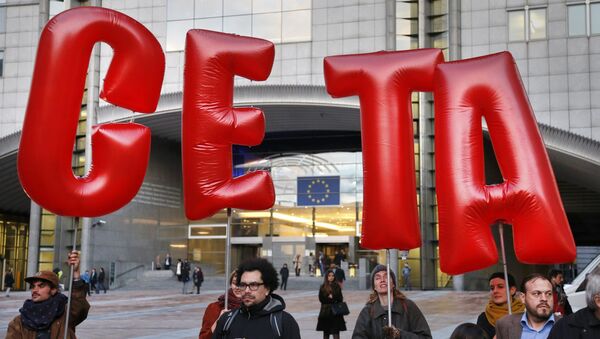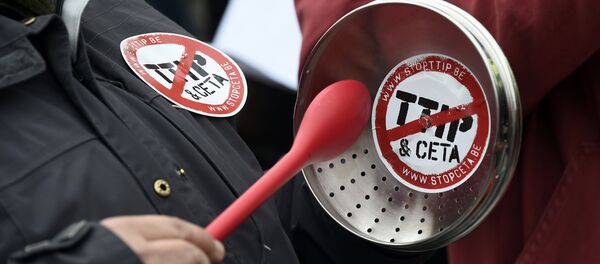The Comprehensive Economic and Trade Agreement (CETA is set to open up a free trade area between the 28 members of the EU and Canada, but — although it has been signed — faced opposition from within the European Parliament, where some MEPs — from the left and the Greens —attempted to send part of it to the European Court of Justice for legal opinion.
The root of the opposition centered on the Investor State Dispute Settlement system, which would allow companies within the trade deal to take legal action, via a special tribunal, against a member state that applied legislation preventing the sale of goods by a company that would affect its profits.
EU Parliament rejects opportunity to clarify legal status of #CETA trade deal. Press comment https://t.co/IP1AzxrDBl #ICS #ECJ pic.twitter.com/NiM6XupIwk
— Greenpeace EU (@GreenpeaceEU) 23 November 2016
A majority of MEPs blocked the move, causing a row, with the Green coalition claiming there was a "clear-cut case" for asking the Court to express a view on whether the dispute resolution system was compatible with EU treaties.
"Giving corporations a whole raft of legal new powers is not only wildly unpopular with people across Europe, it could very well be incompatible existing judicial systems in Europe. So if you have a trade deal that would have far-reaching implications for legal systems, surely the sensible thing to do would be to refer it to the experts on those legal systems so they could give it proper scrutiny before it came into force?" Kevin Smith, from Global Justice Now told Sputnik.
Jerry Dias, National President of Canada's largest private sector union, Unifor said it was an "undemocratic start for an undemocratic deal."
How did your MEPs vote on a resolution to refer #CETA to EU Court of Justice for a legality check? Check here >>> https://t.co/6jGPsXYlyU. pic.twitter.com/ohvgJXh6Jm
— frackfree_eu (@frackfree_eu) November 23, 2016
'Desparation'
The CETA deal has faced similar opposition to the proposed Transatlantic Trade and Investment Partnership (TTIP) agreement which US President Barack Obama had hoped would be signed before he left office.
However, with growing opposition to the investor court dispute system as well as opposition from US President-elect Donald Trump, TTIP has been sidelined. Global Justice Now believes the MEPs who blocked the referral to the European Court of Justice did so out of a sense of "desperation."
"It is desperation that is prompting MEPs to make such irresponsible decisions. Brussels has already been burnt after a tidal wave of people power stopped one toxic trade deal in its tracks (TTIP) and there is a sense amongst those who are deeply wedded to the process that they need to push something, anything through now, regardless of the consequences," Smith told Sputnik.
The hustles in Brussels — MEPs vote to block legal scrutiny of toxic trade dealhttps://t.co/BAICGHFATH#stopCETA #CETA pic.twitter.com/rvYIv6esKk
— Global Justice Now (@GlobalJusticeUK) 23 November 2016
"We are extremely disappointed that the majority of MEPs have chosen to reject our call to refer CETA to the European Court of Justice. Given the huge controversy around the deal, and the serious questions that have been asked regarding its compatibility with EU Treaties, there was a clear-cut case for asking the Court to express a view," said Heidi Hautala, who led the proposal on behalf of the Greens/EFA group.



